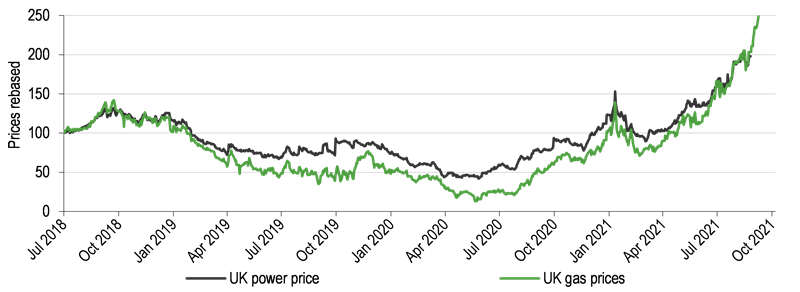Foresight Solar Fund (LON:FSFL) is the largest solar investor listed in the UK by installed capacity. With power prices more than tripling in 2021, FSFL’s c 25% merchant share of revenues allows the fund to benefit from this increase. While a lower discount rate was the largest contributor to the NAV per share increase to 104.1p in Q321 (98.0p at end-June 2021), power prices were the key external factor affecting the NAV. FSFL provides investors with a covered, sustainable and growing dividend (including in 2020 amid depressed power prices), underpinned by subsidised assets in the UK and high-return growth opportunities globally. Given the solar industry’s huge growth potential across the world, National Grid (LON:NG) expects the UK’s solar capacity to more than double within the next 10 years.
UK power and gas prices

Fund objective
Foresight Solar Fund’s (FSFL) investment objective is to provide investors with a sustainable and progressive quarterly dividend underpinned by investments in a geographically diverse portfolio of assets. FSFL aims to preserve and, where possible, enhance capital value. FSFL acquires large-scale solar power plants, identifying solar opportunities in the UK and overseas markets (to 25% of gross asset value) and can also invest in battery storage systems up to a limit of 10% of the GAV.
Bull points
- Solid track record, as illustrated by fully cash-covered and growing dividends to date.
- Foresight is a ‘one-stop shop’ with a wealth of expertise in the solar and renewables sector.
- FSFL valuation is below the peer group average, which suggests a buying opportunity.
Bear points
- Power price volatility.
- High NAV sensitivity to power price, inflation and discount rates.
- Share price performance has lagged the increase in NAV.
Why invest in FSFL?
FSFL targets a net shareholder total return (TR) of 7–8% per year and distributes consistently growing income (6–7% dividend yield) from operating solar plants, battery storage and selling generated electricity to grids. It is the largest diversified solar operator in its peer group. FSFL’s strategy includes consistently maintaining a relatively high proportion of short-term (merchant) energy sales (c 25% for FY21), aiming to benefit from increases in electricity prices. This is higher than the share of peers in FY21 (c 0% for BSIF and c 3% for NESF, see peer group comparison section on pages 7–8 for details). Rising commodity prices during 2021 have led to higher power prices, benefiting FSFL’s merchant revenues and NAV.
The analyst’s view
We believe OECD climate change policies will remain renewable energy friendly, creating further growth opportunities for FSFL. In February 2021, FSFL amended its investment policy to invest up to 10% of gross asset value (GAV) in battery storage and in May acquired its first battery storage asset (see pages 5–6). The manager expects battery storage systems to be value accretive and become increasingly utilised as further grid stability is required in the UK and internationally. FSFL has a high degree of protection against power price fluctuations, as a high share of expected revenues (75% in FY21 and 74% in FY22) is fixed (either by subsidies or power purchase agreements (PPAs)), reducing long-term revenue volatility. All UK assets (83% of GAV) are subsidised and inflation linked.
Click on the PDF below to read the full report:
